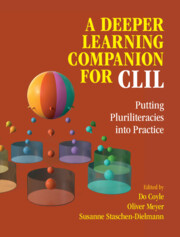Book contents
- A Deeper Learning Companion for CLIL
- A Deeper Learning Companion for CLIL
- Copyright page
- Contents
- Tables
- Figures
- Contributors
- Preface
- Part I Key Ideas and Principles of Pluriliteracies Teaching for Deeper Learning
- Part II Deeper Learning Episodes: First Steps towards Transforming Classrooms
- 5 Chemistry: Exploring Pluriliteracies through a Deeper Learning Episode on Redox Reactions
- 6 Physics: Exploring Pluriliteracies through a Deeper Learning Episode on Rainbows
- 7 Geography: Exploring Pluriliteracies through a Deeper Learning Episode on Global Warming
- 8 History: Exploring Pluriliteracies through a Deeper Learning Episode on the German Empire
- 9 Political Science: Exploring Pluriliteracies through a Deeper Learning Episode on Electronic Waste
- 10 Modern Languages: Exploring Pluriliteracies through a Deeper Learning Episode in French Literature with Younger Beginner Learners
- 11 Religious Education: Exploring Pluriliteracies through a Deeper Learning Episode on Modern-Day Prophets
- 12 Music: Exploring Pluriliteracies through a Deeper Learning Episode on ‘The Wellerman’
- 13 Deeper Learning Mathematics
- References
10 - Modern Languages: Exploring Pluriliteracies through a Deeper Learning Episode in French Literature with Younger Beginner Learners
from Part II - Deeper Learning Episodes: First Steps towards Transforming Classrooms
Published online by Cambridge University Press: 04 February 2023
- A Deeper Learning Companion for CLIL
- A Deeper Learning Companion for CLIL
- Copyright page
- Contents
- Tables
- Figures
- Contributors
- Preface
- Part I Key Ideas and Principles of Pluriliteracies Teaching for Deeper Learning
- Part II Deeper Learning Episodes: First Steps towards Transforming Classrooms
- 5 Chemistry: Exploring Pluriliteracies through a Deeper Learning Episode on Redox Reactions
- 6 Physics: Exploring Pluriliteracies through a Deeper Learning Episode on Rainbows
- 7 Geography: Exploring Pluriliteracies through a Deeper Learning Episode on Global Warming
- 8 History: Exploring Pluriliteracies through a Deeper Learning Episode on the German Empire
- 9 Political Science: Exploring Pluriliteracies through a Deeper Learning Episode on Electronic Waste
- 10 Modern Languages: Exploring Pluriliteracies through a Deeper Learning Episode in French Literature with Younger Beginner Learners
- 11 Religious Education: Exploring Pluriliteracies through a Deeper Learning Episode on Modern-Day Prophets
- 12 Music: Exploring Pluriliteracies through a Deeper Learning Episode on ‘The Wellerman’
- 13 Deeper Learning Mathematics
- References
Summary
Frederic Taveau makes a strong argument for reconceptualising modern languages – in this case French – as a subject discipline, with knowledge domains and pathways that explore alternative ways of learning and using language with beginner or near-beginner students. By foregrounding textual fluency, he challenges more traditional approaches to language learning that emphasise linguistic systems. Instead, he focuses on the use of multimodal literary texts to promote meaning-making and language learning through deepening learners’ critical and cultural awareness of relevant, motivating real-world phenomena. Taveau outlines the processes involved in enabling novice learners of French to become more self-confident and self-directed creative literary writers using language in unprecedented ways. Through a series of scaffolded text-centred learning episodes, learners are guided through pluriliteracies-based steps, increasingly using cognitive discourse functions creatively and confidently (explaining, describing, classifying, arguing and evaluating) to construct their own descriptive literary texts on a Gothic theme. These texts are ‘owned’ by students, demonstrating language learning as a creative, motivating means to understanding their world and that of others.
Keywords
- Type
- Chapter
- Information
- A Deeper Learning Companion for CLILPutting Pluriliteracies into Practice, pp. 184 - 214Publisher: Cambridge University PressPrint publication year: 2023
References
- 1
- Cited by

